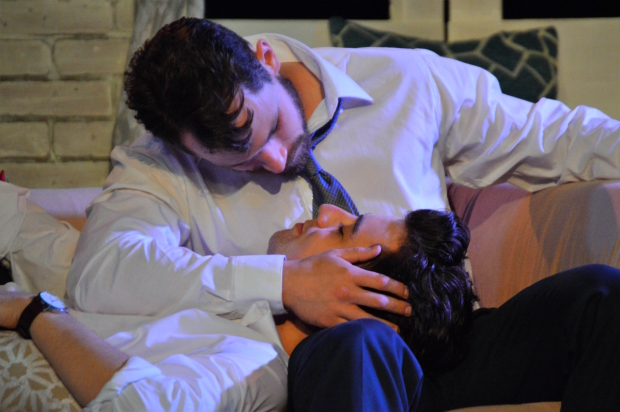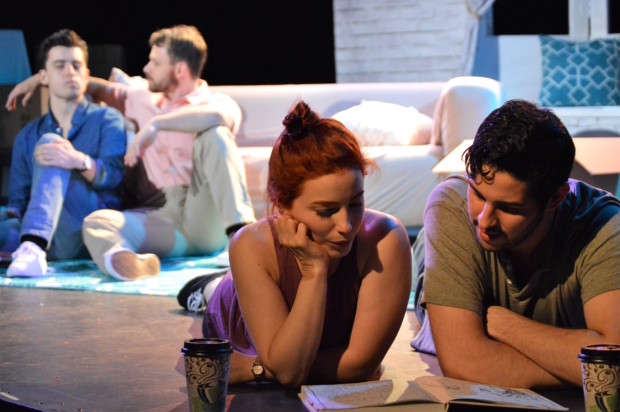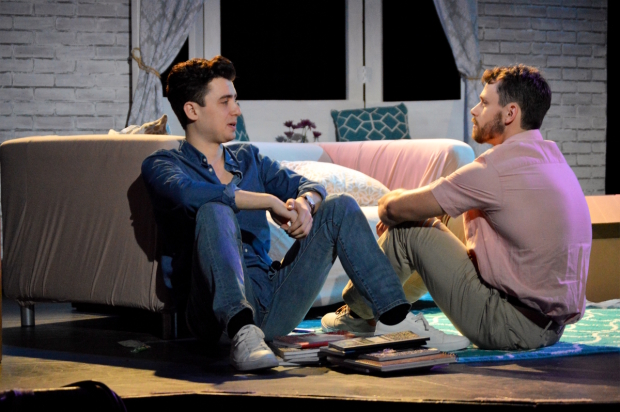Sonder
When a couple move into their new home, the previous residents come to life through the possessions they left behind in this off-Broadway play.

(© Teri Brennan Photography)
Sonder, "a new love story" by Dan Moldovan, began its run at the Players Theatre two days before the climactic weekend of N.Y.C. Pride. The timing could hardly have been better. Moldovan's play follows two couples, one straight and one gay. The gay couple are on their way to becoming happily married, and the straight couple are more gay-friendly than some gays are. If this warm fuzziness sounds like the stuff of a 21st-century Lifetime movie, one of Sonder's triumphs is that it delivers sentiment without getting stuck in sentimentality. For anyone who feels alienated by the gyrating muscle gods on parade floats and rainbow-inflected corporate logos at Pride, Sonder offers a restrained alternative.
The play proceeds gently, though there's a rush of excitement at the beginning as Man and Woman burst into their new home. Greeting them is the furniture and boxed-up belongings of the previous residents, who died eight years ago. As they wait for their own furniture to arrive, they dig through the possessions of their predecessors. What they uncover is the shared life of Mark and Sam, a couple who loved each other deeply.

(© Teri Brennan Photography)
The term "sonder," according to the show program, means "the realization that each random passerby is living a life as vivid and complex as your own." As Man and Woman learn more about Mark and Sam, they experience sonder. (Their names are presumably abstracted to illustrate the universality of the concept.) They also feel increasingly attached to the men coming to life through photos, journal entries, and L.P.s. No wonder — Mark and Sam are endearing. Mark secretly records his conversations with Sam to create a "History of Us" anniversary gift, while Sam delights Mark by twerking with a broom before sweeping the living room.
All the characters, in fact, are endearing, thanks largely to the actors who inhabit them. As Man, Moldovan (doing double duty as a performer) playfully dotes on Woman (Kelsey Claire), his sweetness complementing Claire's spunk. Mark is even more of a doting sweetheart, but Chris Krause plays him with a grinning quirkiness that keeps the character believable. The sight of Mark trying and failing to apply his partner's deodorant to his own armpits is an ecstasy of sheepish inhibition. You can see why Jack D. Martin's Sam is palpably in love with him.

(© Teri Brennan Photography)
The actors give these characters life, but the script gives them something more. Moldovan's play transcends realism by populating the same space with characters from different times, Arcadia-style. But while in Tom Stoppard’s play the characters residing at an English country estate are roughly 200 years apart, here less than a decade separates Man and Woman from Mark and Sam. The couples sit on the same couch, dance to the same music, and get high from the same stash (Man finds a bag of Sam and Mark's weed), tantalizingly close yet always invisible to each other.
This conceit allows director Joseph C. Walsh to stage small marvels, as when Woman lugs a record player found in the basement across the living room while Sam, who originally brought the record player to the house, holds the other side of it, carrying it across the room eight years before. Both couples then put on the same album and waltz to "The Rainbow Connection," Woman and Mark protesting at first but then giving in to their partners' insistence. The loving pairs move in sync, and the scene itself makes a rainbow connection between past and present.
Adding to the show's luster are the costumes (designed by Lauren Pivirotto) and lighting (Erin Nihill). Upon seeing a photo of Mark and Sam at their wedding, Man exclaims, "Damn, those are some nice suits!" And they are, especially the navy blue ensemble in which Pivirotto outfits Mark. Nihill's contribution is subtler but no less significant. She gradually leads Man and Woman out of darkness in their new home, first with the electric glow of the battery-powered candles in the couple's emergency move-in kit, and then with realistic living room light when Man finds the fuse box.
For all its merits, Sonder isn't perfect, but its digressions into implausibility (for example, Mark waits until his wedding day to tell Sam about the first time he noticed him) are outshined by what it gets right. There's something profoundly metatheatrical that Sonder makes viewers do. It presents two people getting to know two strangers and coming to recognize the intensity of their humanity. That's what theater, at its best, does for an audience. It presents the lives of others and forces you into them, whether the characters lived in an English country house two centuries ago or eight years ago in your own home.









